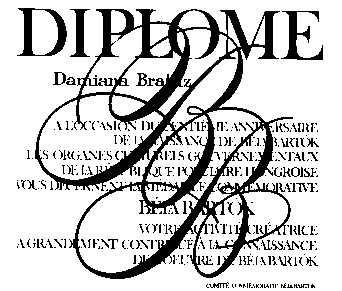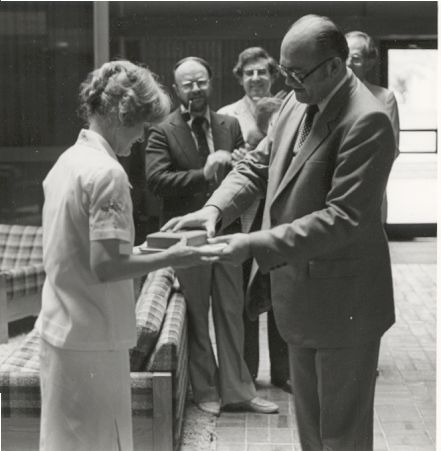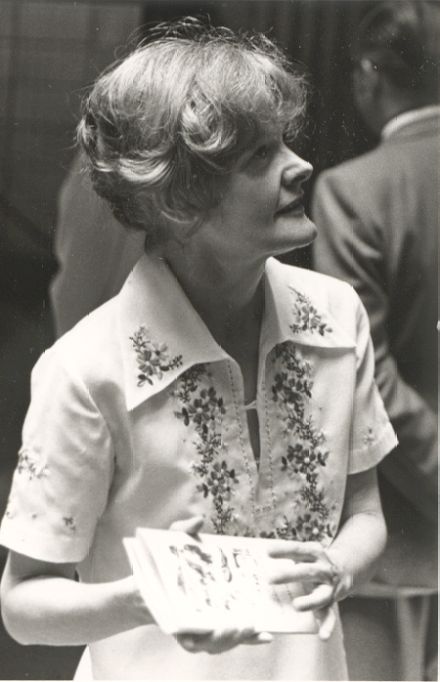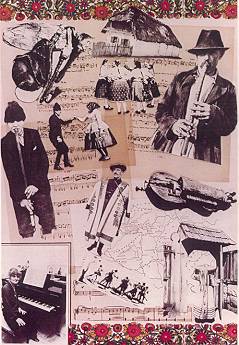 |
Bartókiana - Bartók Centenary Award

A L'OCCASION DU CENTIÈME ANNIVERSAIRE
DE LA NAISSANCE DE BÉLA BARTÓK
LES ORGANES CULTURELS GOUVERNEMENTAUX
DE LA RÉPUBLIQUE POPULAIRE HONGROISE
VOUS DÉCERNENT LA MÉDAILLE COMMÉMORATIVE
BÉLA BARTÓK
VOTRE ACTIVITÉ CRÉATRICE
A GRANDEMENT CONTIBUÉ À LA CONNAISSANCE
DE L'OEUVRE DE BÉLA BARTÓK.
COMITÉ COMMÉ MORATIF BÉLA
BARTÔK
Bartók Centenary Award Ceremony [6 pictures, re-distribute them]. Faculty of Music, University of Western Ontario.

September 7 1981. Hungarian ambassador, Gyula Budai, and the embassy's first secretary, Imre Ugrai, presented Dr. Bratuz with an award in honor of her work on behalf of Hungarian composer Béla Bartók.
In the background: Dean of Music Jack Behrens, Chairman Robert Creech and Prof. Ralph Aldrich.




Bartók Centenary Award 1981 - In my piano studio.

From International
Musician, December 1981
University of Western Ontario Professor of Music, Damjana
Bratuz, has been awarded one of only three plaques presented
to Canadians in honor of the Béla Bartók centennial
being celebrated this year. In a ceremony September 7 at theUuniversity
Music Faculty in London, Hungarian ambassador, Gyula Budai,
and the embassy's first secretary, Imre Ugrai, presented Bratuz
with a scroll and the award in honor of her work on behalf
of the famous Hungarian composer.
Bratuz is touring North America performing and lecturing on
the music of Bartók. She has appeared at majors universities
in Canada and the United States with her presentations.
The other Canadians to receive the honor were Zoltan Szekely
of Banff, British Columbia, for whom the Bartók Violin
Concerto was written, and Calgary Symphony conductor, Arpad
Joo, who recorded the Bartók orchestral works.
POSTER FOTO 'THE WORLD OF BÉLA
BARTÓK' (Illustrated Lecture)
Centenary Tour, 1981-1982

[From "Bartk Revisited"
- An Illustrated Lecture, Faculty of Music, The University
of Western Ontario, London, Canada, October 30, 1992.]
When in the fall of 1981 the Ambassador of Hungary came
to UWO to deliver to Prof. Bratuz the Bartk Centenary award,
it was to honour her long-standing activit cratrice [qui]
a grandement contribu la connaissance de l'oeuvre de Bla
Bartk.
This multi-faceted activity - as an interpreter of Bartk's
music, scholar and pedagogue - originated at Indiana University
during her doctoral studies in the 1960s. As a performer,
not only was she at that time among the very few who, as the
Washington Post reported, in recitals of enormous
musical interestsummoned the courage to program the more
daring late compositions of Liszt; she also validated
Bartk's view of Liszt as precursor in structural experimentation.
In 1967, Bence Szabolsci, the late, preeminent Hungarian
musicologist, praised the novelty and the value of her earliest
investigations into the folk material Bartk had used for
its structural, as well as expressive, properties. Since then,
throughout her academic career in Canada, her study has developed
into a vast, as well as original, inquiry, faithful always
to a performer's task and point of view, that is, to examine,
and contribute to, the reception of Bartk's music.
Therefore, she has shared the results of her studies in live
illustrated programmes, with a wide range of audiences, from
the international academic world to the general public, from
major centres (Ottawa, Chicago, Budapest, Vienna) to small
communities (Corner Brook, NF). Equally varied has been the
range of formats, from conference papers to multi-media presentations
that included folk dancers' participation.
In piano teaching, her approach has represented in Gyrgy
Sebk's words a unique pedagogical help in the field,
one in which the analysis of Bartk's musical material serves
the practical consequences in the performance. She
has been a frequent guest at major Canadian universities for
Bartk seminars, lecture-recitals, workshops, master classes;
has offered summer courses or residencies (Banff Centre, University
of Victoria); and at the University of Western Ontario she
has conducted undergraduate and graduate courses devoted to
Bartk studies.
Her path-breaking approach has led to further awards (Italian
Government, University of Bologna 1989-90) and participation
in international semiotic research. In 1993, at the Centre
for the Study of Theory and Criticism, UWO, Dr. Bratuz established
an interdisciplinary course that included the study of Bartok's
connection with American semiotic research during his exile
in the United States.
Professor Bratuz is one of the very few artist-teachers and
academicians to explore the semiotics of performance. At the
UWO Centre for the Study of Theory and Criticism, she has
established a graduate course in Interdisciplinary Research
with Music. Dr Bratuz has a strong interest in cross-cultural
semantics, and has given numerous papers examining musical
topics from cross-disciplinary and cross-linguistic perspectives.
(Her mother-tongue is Slovenian, she was educated in Italian,
and is equally at home in English and French).
|